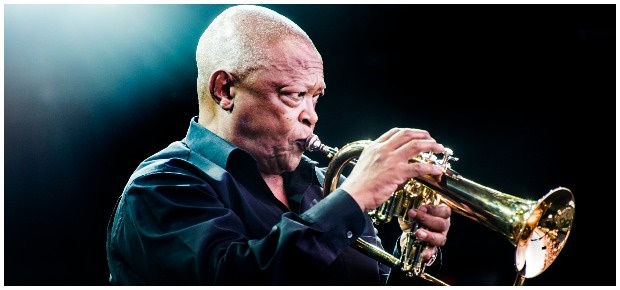
The voice on the other end of the line was loud, raspy and a little homesick.
“Anjani amagwinya lapho ekhaya mfowethu. Nisaphila kahle? (How are the amagwinyas at home, my brother. Is everything okay there?).” “Yeah, who’s this?” I said a little impatiently as we were right in the middle of deadline and reporters were bashing furiously at their typewriters to get copy through on time. “I’m Hugh Masekela,” he said.
He was calling from New York, he added. And time stopped. “Hugh Masekela?” I screamed with joy, excitedly gesturing to my colleagues to keep it down. “Hold on, hold on, Bra Hugh,” I said, almost falling out of my chair. The typing had stopped and everyone was looking at me. “Really, are you joking, man?” one scribe asked. No, it wasn’t a joke. The mighty Hugh Masekela was on the line, talking to me, a journalist at The Post at the time. Someone called the deputy editor, Aggrey Klaaste, who couldn’t contain his glee.
“You have Hugh Masekela on the line?” Klaaste asked. I nodded, telling Bra Hugh to hold on. “This is a front-page scoop,” said an equally exhilarated Klaaste whose brother, pianist Sal Klaaste, had left for London with Masekela and the cast of the jazz opera King Kong in 1961. “This is a big story for us,” he said. It was 18 years since Hugh Masekela had left South Africa and he was missing home. He wanted to find out how life was in SA and to tell his fans, loved ones and South Africans that he really missed them.
He missed eating amagwinya and the buzzing townships and the shebeens, which were an integral part of our lives in the ’70s. And so he’d picked up the phone, called The Post and I’d answered. He then asked about journalist Mike Phahlane, nicknamed “the indestructible” on account of surviving being thrown out of a high-rise building, being shot at, stabbed and pushed out of moving trains. Phahlane had protected him and other musicians from gangsters in Sophiatown and Alexandra in the past, he reminisced, and he was grateful.
He recalled how feared gangsters came to shows, jumped on stage and stopped them in the middle of a performance, trying to jackroll, or take by force, beautiful singers like Miriam Makeba and Thandi Klaasen. But if Phahlane was in the audience, he would risk his life to protect the musicians. This was 39 years ago, after Masekela went into exile and it was the beginning of a friendship with a man I’d always respected and admired.
My last conversation with Bra Hugh was a little more difficult. I placed a call to him in October last year, after he decided to take a break from stage performances due to his illness. I was fortunate to be, to my knowledge, the last journalist to interview him (I’m ready to fight this, 19 October 2017). This time, I was the one calling him to find out how he was. Instead of the sickly man I was expecting, he was the same as always, bubbly and full of life as he talked about his cancer. We hadn’t spoken for about a year before I placed what would be my last call to the legend.
“I’d love us to meet again and talk,” he said. “We go back a long way and we’ll go forward a long way. I’m not well. I’m battling prostate cancer and my cells are going haywire and spreading. “But now I feel much better. You can hear that, my brother. It’s a tough battle, but I have the support of my family and friends, and that’s the greatest source of my strength,” he said.
The interview was interspersed with pauses and I could hear him breathing heavily on the other end of the line. “I woke up feeling a bit down, but your call means a lot to me,” he continued.
“It came as a shock when the doctor told me there was a metastasis, which means the cancer cells are spreading. “Hey, tell me, when are we going to meet again and talk about a lot of things? We must make time when I am better to meet and talk about the past, present and future,” he said.
But that was never to be. Man plans, as they say, and God decides.
Bra Hugh wasn’t just a musician, he was also a master storyteller. He would often reminisce about legendary photographer Alf Kumalo, who he was close to. When Hugh was 16 his headmaster at the then St Peter’s Secondary School, Father Trevor Huddleston, had given him a trumpet – a gift from American jazz giant Louis Armstrong.
The then DRUM photographer Alf Kumalo took the young Masekela to Alexandra to take pictures of him with his new horn.
“Bra Alf made me hold the trumpet in my right hand and jump up – arms and legs stretched out – to take the image he wanted,” he told me during one of our visits. “He made me repeat this several times and my friend George Phahle, who was with us, was becoming restless and wanted us to go. He shook his head and said: ‘Hey, Hugh, die groot man dink jy’s ’n moegie, ’n moemish (He thinks you’re a clown).
“‘Tell him you’re not a clown, man, and stop jumping up and down’. But the photographer was patient and knew what he wanted – to capture that moment, press the shutter and get a beautiful picture.” The picture of the young Masekela jumping became iconic and is on the cover of his autobiography, Still Grazing. After studying at the Manhattan School of Music in New York, he wanted to join jazz artist Les McCann’s band but he recalled it was hard. “Les refused to hire me. He said, ‘Look man, you are from Africa and jazz is an American thing. Do your own thing, man, because we all want to hear what is coming from Africa, something fresh and new’.” That rejection was a turning point in Masekela’s career and he went on to carve himself a niche in the world.
When Bra Hugh came back to the country, he took his stepson, Adam, to St Martin’s School. My son, Lwazi, was at the same school and this strengthened my friendship with the iconic musician. I remember one afternoon being late to pick up my son from rugby and a familiar voice shouted from a parked Rover. “Hey, Ngwenya, you’re late and you owe me money for looking after your son.” I turned and there was Masekela sitting in the car with Adam and my son, all laughing. The man who graced international stages didn’t mind taking my son from school and dropping him at home when I was unavailable. He opened his home to my kid, and I did the same to Adam, who now lives in Ghana. Masekela was also quite sensitive and he took it hard when jazz critic and baritone saxophonist Don Albert said Masekela wasn’t playing jazz. One night while performing at Kippies, on the Market Theatre precinct in Joburg, I was sitting in the audience with Albert and Bra Hugh said, “Don Albert says I don’t play jazz. Listen to this.” And he blew a hard bop, squeezing notes into a bar with dazzling speed. He blew us away that night. That’s who he was. Passionate, sensitive and a champion of Africa. Rest in power, my friend.


















